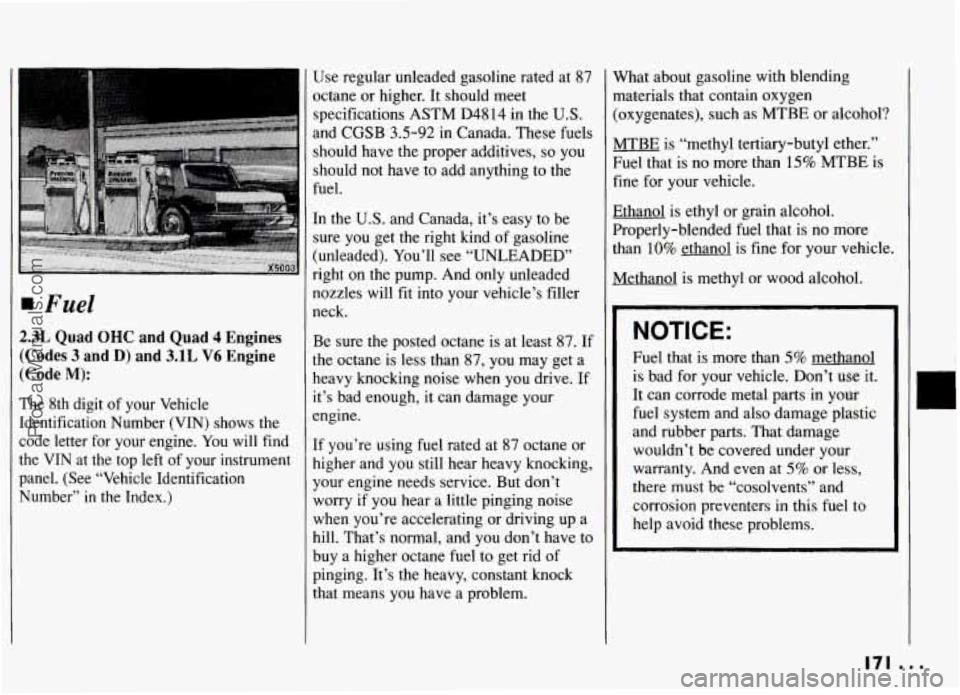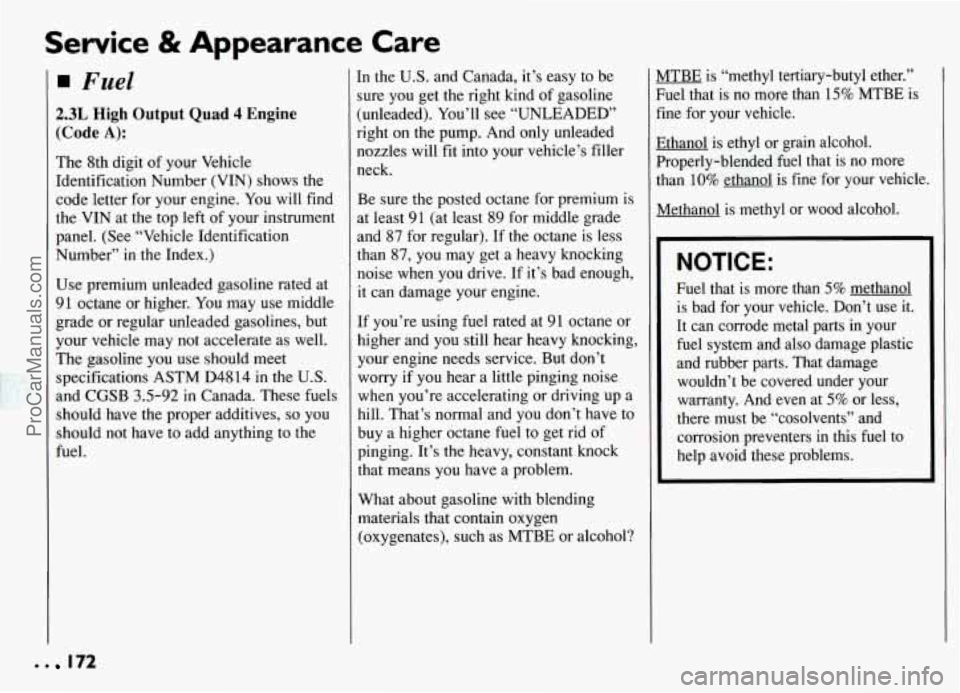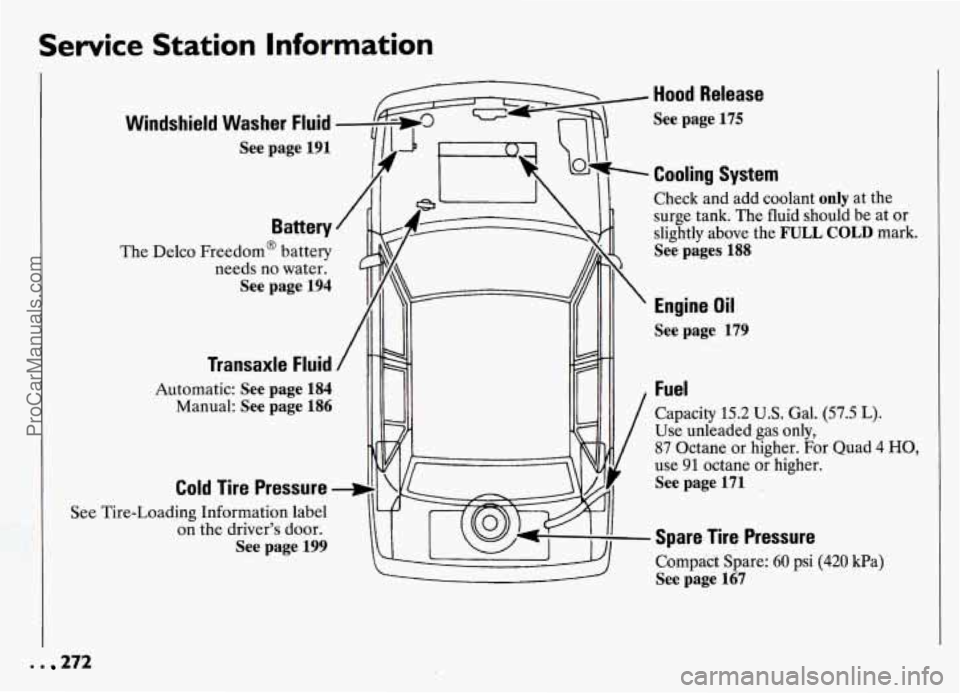1994 PONTIAC GRAND-AM octane
[x] Cancel search: octanePage 172 of 274

I Fuel
!.3L Quad OHC and Quad 4 Engines
Codes
3 and D) and 3.1L V6 Engine
Code
M):
’he 8th digit of your Vehicle
dentification Number (VIN) shows the
:ode letter for your engine. You will find
he VIN at the top left of your instrument
)anel. (See “Vehicle Identification
Vumber”
in the Index.)
Use regular unleaded gasoline rated at 87
octane or higher. It should meet
specifications ASTM D4814 in the
U.S.
and CGSB 3.5-92 in Canada. These fuels
should have the proper additives,
so you
should not have to add anything
to the
fuel.
In the U.S. and Canada, it’s easy to be
sure you get
the right kind of gasoline
(unleaded). You’ll see “UNLEADED’
right on the pump. And only unleaded
nozzles will fit into your vehicle’s filler
neck.
Be sure the posted octane is at least 87. If
the octane is less than
87, you may get a
heavy knocking noise when you drive.
If
it’s bad enough,-it can damage your
engine.
If you’re using fuel rated at 87 octane or
higher and
you still hear heavy knoclung,
your engine needs service. But don’t
worry
if you hear a little pinging noise
when you’re accelerating or driving up a
hill. That’s normal, and you don’t have to
buy a higher octane fuel
to get rid of
pinging. It’s the heavy, constant knock
that means you have a problem.
What about gasoline with blending
materials that contain oxygen
(oxygenates), such as MTBE or alcohol?
MTBE is “methyl tertiary-butyl ether.’’
Fuel that
is no more’than 15% MTBE is
fine for your vehicle.
Ethanol is ethyl or grain alcohol.
Properly-blended fuel that is no more
than
10% ethanol is fine for your vehicle.
Methanol is methyl or wood alcohol.
NOTICE:
Fuel that is more than 5% methanol
is bad for your vehicle. Don’t
use it.
It can corrode metal. parts in yohs
fuel system and also, damage plastic
and rubber parts. That damage
wouldn’t be covered under your
warranty. And even at
5% or less,
there must be “cosolvents” and
corrosion preventers in
this fuel to
help avoid these problems.
171 ...
ProCarManuals.com
Page 173 of 274

Service & Appearance Care
Fuel
2.3L High Output Quad 4 Engine
(Code A):
The 8th digit of your Vehicle
Identification Number (VIN) shows the
code letter for your engine. You will find
the VIN at the top left of your instrument
panel. (See “Vehicle Identification
Number” in the Index.)
Use premium unleaded gasoline rated at
91 octane
or higher. You may use middle
grade or regular unleaded gasolines, but
your vehicle may not accelerate as well.
The gasoline you use should meet
specifications ASTM D4814 in the
U.S.
and CGSB 3.5-92 in Canada. These fuels
should have the proper additives,
so you
should not have to add anything to the
fuel.
In the U.S. and Canada, it’s easy to be
sure you get the right kind of gasoline
(unleaded). You’ll see “UNLEADED’
right on the pump. And only unleaded
nozzles will fit into your vehicle’s filler
neck.
Be sure the posted octane for premium is
at least 91 (at least 89 for middle grade
and
87 for regular). If the octane is less
than
87, you may get a heavy knocking
noise when you drive. If it’s bad enough,
it can damage your engine.
If you’re using fuel rated at 91 octane or
higher and you still hear heavy knocking,
your engine needs service. But don’t
worry
if you hear a little pinging noise
when you’re accelerating or driving up a
hill. That’s normal and you don’t have to
buy a higher octane fuel to get rid of
pinging. It’s the heavy, constant knock
that means you have a problem.
What about gasoline with blending
materials that contain oxygen
(oxygenates), such as MTBE or alcohol?
MTBE is “methyl tertiary-butyl ether.’’
Fuel that
is no more than 15% MTBE is
Fine for your vehicle.
Ethanol is ethyl or grain alcohol.
Properly-blended fuel that is no more
than
10% ethanol is fine for your vehicle.
Methanol is methyl or wood alcohol.
NOTICE:
Fuel that is more than 5% methanol
is bad for your vehicle. Don’t use it.
It can corrode metal parts in your
fuel system and also damage plastic
and rubber parts. That damage
wouldn’t be covered under your
warranty. And even at
5% or less,
there must be “cosolvents” and
corrosion preventers in this fuel
to
help avoid these problems.
. . 172
ProCarManuals.com
Page 268 of 274

Lights on Reminder .............. 77
Loading Your Vehicle
........... 197
Locks. Door
.................... 47
Automatic Door Lock .......... 48
Rear Door Security Locks
...... 49
Low Battery
................... 149
Low Oil Pressure Warning
...... 95. 96
Lubricants and Fluids
............ 238
Lumbar Support
.................. 9
Maintenance Record ........... 240
Maintenance Schedule
........... 223
Maintenance Services. Scheduled
. . 225
Malfunction Indicator Lamp
...... 100
Manual 4-Way Adjustable Seat ...... 8
Manual Front Seat ................ 8
Manual Lumbar Support
........... 9
Manual Transaxle
Adding Fluid ............ 187. 215
Checking Fluid
.............. 186
Parking
..................... 69
Shifting
..................... 64
Starting Your Engine
........... 56
Upshift Indicator Light
......... 67
Master Cylinder. Brake .......... 191
Methanol in Gasoline ........ 171. 172
Mileage Indicator (see “Odometer
Mirrors
& Speedometer”)
Convex Outside .............. 83
Inside Manual Daymight
....... 82
Manual Remote Control
........ 83
I
I
I
I
I
I
1
Power Remote Control ......... 84
Mountain Driving
............... 134
New Vehicle “Break-In”
Requirements .................. 54
Night Driving
.................. 129
Night Vision
................... 129
Octane Requirements (see “Fuel
Requirements”) ............... 17 1
Odometer
& Speedometer ......... 92
Off Road Recovery
............. 127
Oil. Engine
.................... 179
Pressure Gage ................ 96
Quality
.................... 180
Thickness .................. 180
Used Oil
................... 182
When to Change
.............. 182
Operation of Lights .............. 77
Outside Rearview Mirrors
......... 83
Overheated Engine
.............. 156
Overheated Engine Coolant Warning
Light ......................... 94
Owner Checks
& Services ........ 232
Oil Warning Light ............... 95
Parking
On Hills .................... 145
With the Engine Running
.... 68. 70
Parking Brake
................... 66
Over Things That Burn ......... 69
Park . Shifting Into ............ 60. 67
Passenger Belts (see “Safety Belts”)
Passenger Side Cup
Holder/Storage Area ............ 85
Passing
....................... 127
Polishing and Waxing (see
Power Door Locks ............... 48
Power Mirrors
.................. 84
Power Seat Controls
............... 9
Power Steering Fluid ............ 190
Power Window Lock-Out Switch ... 72
Power Windows
................. 72
Pregnancy. Use of Safety Belts
During ....................... 26
Problems on the Road
........... 147
Publications (see “Service
Publications”) ................ 250
Radiator Overheating
(see “Overheated Engine”) ....... 156
Radio (see “Audio Systems”)
..... 106
Reading Lights
.................. 79
Rear Door Security Locks
......... 49
Rear Safety Belt Comfort Guides
... 30
Rear Seat. Split Fold-Down ........ 11
Rear Window Defogger
.......... 105
Rearview Mirrors ................ 82
Reclining Seatbacks
............... 9
Recommended Fluids
& Lubricants 238
Remote Fuel Filler Door
......... 174
Remote Trunk Release
............ 53
Replacement Brakes
............. 193
“Appearance Care”)
267 . .
ProCarManuals.com
Page 273 of 274

Service Station Information
See
7
Windshield Washer Fluid
Battery
The Delco Freedom@ battery
needs no water.
See page 194
Transaxle Fluid
Automatic: See page 184
Manual: See page 186
Cold Tire Pressure
Tire-Loading Information label
on the driver's door.
Seepage199
- Hood Release
See page 175
- Cooling System
Check and add coolant only at the
surge tank. The fluid should be at
or
slightly above the FULL COLD mark.
See pages 188
Engine Oil
See page 179
Capacity 15.2 U.S. Gal. (57.5 L).
Use unleaded gas only,
87 Octane or higher. For Quad 4 HO,
use 91 octane or higher.
See page 171 .
- Spare Tire Pressure
Compact Spare: 60 psi (420 kPa)
See page 167
. . 272
ProCarManuals.com